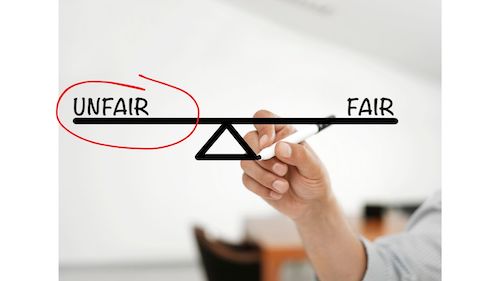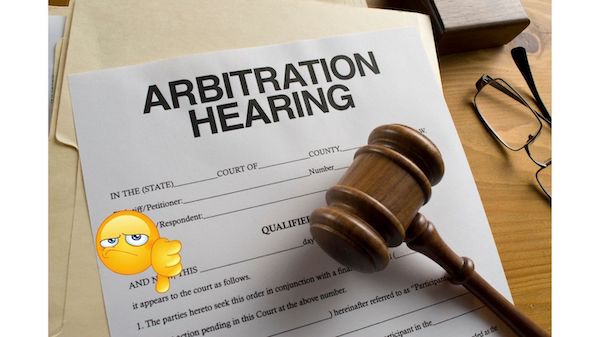On April 25, 2016, the Second Circuit U.S. Court of Appeals reinstated a 4 game suspension of Tom Brady, then Patriots QB, for his role in Deflategate. The original decision for a 4 game suspension came from NFL commissioner, Roger Goodell, via an arbitration proceeding. So what does the Deflategate saga have to do with Montana arbitration law? Bear with me as I explain how deflategate is a textbook example of the unfairness of forced arbitration.
Note – I really just want to write about this because I am a Brady fan and I am still bothered by Deflategate! But hey, it happens to have a little to do with my job and Montana arbitration law too!
What is Arbitration?
Arbitration is one type of what is called “alternative dispute resolution” (ADR). In arbitration, instead of going to Court, the parties resolve their dispute via arbitration. In arbitration, an arbitrator decides the case, instead of the court system. Arbitration is a flexible process that may or may not include many of the foundations of the justice system. For instance, evidence, witnesses, rules, are subject to the whims of the arbitrator and may or may not be fair in Montana arbitration.

There are different types of arbitration. The parties present their case to the arbitrator, via whatever rules are in place, and the arbitrator renders a decision. Proponents of arbitration argue that arbitration is good because it is more efficient and less costly than the Court system. Critics, including myself, would argue that arbitration is far less fair than court and tends to favor the more powerful party.
Arbitration can also be forced or voluntary. Voluntary arbitration might be ok if both parties genuinely agree to arbitrate. But Forced arbitration is bad if allowed under Montana arbitration laws.
Why Would Forced Montana Arbitration Be Bad?
To understand why forced Montana arbitration is bad, in my opinion, let’s start with who typically wants Montana arbitration. Arbitration is almost always desired by the party who already has the power/money advantage. Big companies, employers, etc. For instance, you will find arbitration agreements in cell phone contracts, credit card contracts, bank contracts, car purchase agreements, insurance contracts, etc. These are just a few examples. Certainly, not every type of contract I mention has an arbitration agreement, but many do.
Oftentimes these contracts are presented as take it or leave it propositions. In other words, if you want a cell phone, you are likely going to have to sign Verizon’s agreement. You don’t have much of a choice. You want a credit card — sign the agreement. It’s not like Visa allows you to negotiate its contract. You want to work for a large company? Sign the contract. Such take it or leave it contracts are called “contracts of adhesion,” where you have no choice but to agree.

Forced Montana arbitration typically removes the case from Court. In other word, forced Montana arbitration usually means the parties do not have the ability to file a lawsuit in court. Not being able to file in Court means that the parties forfeit their 7th Amendment right to a trial by jury. Did you know that you are forfeiting one of your Constitutional Bill of Rights when you buy that new cell phone?
Why is it such a big deal if you get forced into Montana arbitration and you can’t go to Court? Court is the only venue where you really get a fair shake. Despite what you hear from certain parties in power, America’s Court system is as fair of a process as you will find in the modern world. Our court system has been refined by centuries of law, and allows all parties an equal opportunity to present their arguments. Most importantly, America has the 7th Amendment Right to a jury trial. There is no greater and more beautiful form of local government that having cases decided by local community members. Juries are the conscience of the community. For a full discussion of the importance of the jury trial, read here. If allowed, Montana arbitrations strips your jury trial right.
Montana Arbitration often involves a David versus Goliath dynamic. Goliath wants arbitration, David does not. Why? Because the party in power (Goliath) often gets to control or at least heavily influence the arbitration process, something Goliath can’t do in Court. Corporations don’t like accountability, they want predictable favorable outcomes. In many cases, that means Goliath gets to pick the Arbitrator. Maybe it’s an arbitrator they use over and over. Maybe it’s an arbitrator they know will likely rule in their favor. Maybe it’s an arbitrator that actually is AN EMPLOYEE OF GOLIATH!! WHAT!!
That brings me to Deflategate and how it ties into Montana arbitration law……
Deflategate
Deflategate was a scandal that took over the football world in 2015. On January 18, 2015, the Patriots beat the Colts in the AFC Championship game. During the game, a Colts player intercepted a Tom Brady pass and took the ball to the sideline. The Colts player felt like the ball was a little soft, and expressed concern that it was under-inflated. The NFL took the Patriot’s balls used in the first half and measured the PSI (pounds per square inch), which revealed that the PSI of all but one of the balls was below the NFL threshold.
Deflategate ensued. The Patriots finished the season, winning his 4th Super Bowl. On May 11, 2015 the NFL suspended Brady for four games for the upcoming season.

Bear with me as my fandom shows. Whatever you think about Brady, there were very good arguments that nothing was wrong with the footballs. As we Montanans know well, air pressure in our tires drops significantly when it’s cold. If you have a newer vehicle with the digital tire pressure on the dashboard, you can clearly see your tire pressure change with the temperature. The same phenomenon happens to footballs. Here’s an engineer’s description of the phenomenon.
For the AFC championship, there was an approximate 25 degree difference in temperature between where the footballs were prepped indoors, and outside at the game. Thus, it was scientifically absolute that the balls would decrease in pressure naturally due to the temperature change. In fact, it would only be suspicious if the balls didn’t decrease in pressure.
It’s the Ideal Gas LAW!!! PV = nRT……. It’s SCIENCE! Am i right?!
Ok, I’m done (mostly) with my Patriots rant. Suffice it to say, there was very strong evidence that nothing nefarious occurred. The problem is that due to forced arbitration, Brady was not allowed a fair chance to prove his innocence. The outcome appeared predetermined. What ensued is a classic example of railroading that occurs with forced arbitration.
The NFL handed down the punishment, via its Commissioner, Roger Goodell. The labor agreement between the NFL and the Player’s Association required appeals to be decided via forced arbitration. Tom Brady was not allowed to go to Court to make his case. Why was this unfair?
Because Roger Goodell appointed HIMSELF as the arbitrator, even though he was the one who suspended Brady in the first place! In an amazing and absurd example of the unfairness of forced arbitration, Roger Goodell, the leader of the NFL appointed himself to decide whether his own decision was correct!! It’s the proverbial fox guarding the henhouse.
Imagine you have a dispute with Verizon wireless about your cell phone bill, and the arbitrator is the CEO of Verizon! Good luck with that. Or imagine you are arguing with your insurance company and the insurance CEO gets to decide the case! That’s what happened with Brady — it was unbelievably unfair and one-sided. If Tom Brady can get railroaded by arbitration, what can happen with you?!
There was no chance that Goodell was going to overturn himself. The arbitration was a sham, and Goodell of course decided that he and the NFL were right, and Tom Brady was wrong. Brady had little chance to argue his innocence.

I know Tom Brady is rich and famous, but in this case he was the David against the Goliath that was the NFL machine and its other 31 non-Patriots owners. Tom Brady’s millions are nothing compared to the NFL and its owners hundred of billions. The NFL wants arbitration because it can appoint its own commissioner to rubber stamp it’s own decisions. It is patently unfair. So what about Montana arbitration law?
Montana Arbitration Law
Now that you know arbitration is (generally) bad for the consumer, victim, harmed-party, let’s talk Montana arbitration law. Since we know arbitration is bad the question is simply — does Montana law allow arbitration or not? Like many legal questions — it depends.
Montana has adopted the Uniform Arbitration Act, and favors arbitration. Also, the Federal Arbitration Act (FAA) governs arbitration agreements made in interstate commerce.
Thus, in general Montana arbitration is allowed. Where Montana arbitration law holds firm is that if a party challenges an arbitration agreement in a contract (ie, doesn’t want to arbitrate), that party can file in Court to determine if the arbitration agreement is valid. Bluebird, para. 11. In other words, before the arbitration process starts, a party can file in court asking the Court to declare the arbitration clause invalid, in which case they would then be able to file in Court about the actual dispute. This is different that with Tom Brady — where he was forced to arbitrate, no questions asked.
Arbitration typically arises when there is a contract between the parties that purports to require arbitration. When an arbitration clause is in a contract, typical principles of contract law apply. Thus, an arbitration clause can be challenged based on concepts that apply to contracts such as fraud, unconscionability, duress, or perhaps others. Bluebird Property Rental, LLC v. World Business Lenders, LLC, 2024 MT 279.
There’s a number of Montana arbitration law cases that show the unfairness of arbitration agreements, similar to Deflategate, One clear example of unconscionability came in Iwen v. US West, 293 Mont. 512 (1999). In Iwen, a telecommunication company (US West) screwed up a yellow page add for a customer. The telecommunication company refused to make it right and sent the guy to collections. The contract had been solely written by US West, and presented as take it or leave it. The contract had a one-sided arbitration agreement — it allowed US West to sue in Court, whereas the customer was forced to arbitrate. Why would US West do that?
Because US West knows that arbitration is unfair to the customer. It wanted to be able to screw over the customer and force customer into arbitration. US West could the control the arbitration process, and likely stack the deck so that it would win, even if it did something wrong or illegal. Yet, in a tacit admission that arbitration is a sham, US West wrote in the contract that it was allowed to sue the customer in Court if it wanted to! US West was allowed to sue in Court, whereas the customer could only arbitrate.
The Iwen case is a great example of how these giant corporations try to use Montana arbitration to make it so they can’t lose, even if they screw someone over. Luckily, the Court in Iwen saw right through it and declared the arbitration clause invalid as unconscionable. The Court said, “US West Direct pointedly protected itself by preserving its constitutional right of access to the judicial system while at the same time completely removed that right from the advertiser.”

Fraud and duress are other examples. For instance, if you were tricked into signing a contract, or forced at proverbial gunpoint.
Congress and the United States Supreme Court have seemingly tried to force more arbitration on states, but Montana arbitration law has pushed back to the extent it can. For instance, in 2016 the Montana Supreme Court upheld Iwen despite some US Supreme Court cases that whittled away at state’s rights. See, Global v. Ossello, 2016 MT 50. Just like Ossello, Iwen involved a similar one-sided clause that allowed the powerful party to sue in Court, whereas the weak party was forced to arbitrate. The Montana Supreme Court found the forced arbitration clause invalid.
Unfortunately, Montana arbitration law does allow arbitration agreements. But where Montana holds firm is that an arbitration agreement found in contract can often be challenged in Court, and if successful, reinstate your constitutional right to trial by jury,
Conclusion
So did I really just want to right about Tom Brady and that’s why I wrote this…. DUH!. But hopefully this article provides an understanding of why arbitration is often bad for the little guy. At Duckworth Law we represent the little guy against insurance companies, corporations, big employers, etc., thus we feel strongly about making sure the little guy gets a fair shake in court and not in a one-sided Montana arbitration. If Tom Brady can get bullied, anyone can.
Justice Trieweiler, a now-retired Montana Supreme Court wrote a wonderful concurrence in another famous Montana arbitration case , which went back and forth to the US Supreme Court. Casarotto v. Lombardi, 268 Mont. 369 (1994) (Trieweiler’s Concurrenc). Unfortunately the US Supreme Court disagreed, but Trieweiler’s words are timeless and wise regarding Montana arbitration. He understood well the unfairness of arbitration. He wrote:
In Montana we are reasonably civilized and have a sophisticated system of justice which has evolved over time and which we continue to develop for the primary purpose of assuring fairness to those people who are subject to its authority,
Over the previous 100 years of our history as a state, our courts have developed rules of evidence for the purpose of assuring that disputes are resolved on the most reliable bases possible.
Based on the presumption that all men and women are fallible and make mistakes, we have developed standards for appellate review which protects litigants from human error or the potential arbitrariness of any one individual.
We believe in the rule of law so that people can plan their commercial and personal affairs. If our trial courts decline to follow those laws, our citizens are assured that this Court will enforce them…..
We believe that our courts should be accessible to all, regardless of their economic status, or their social importance, and therefore, provide courts at public expense and guarantee access to everyone…..
We have contract laws and tort laws. We have laws to protect our citizens from bad faith, fraud, unfair business practices, and oppression by the many large national corporations who control many aspects of their lives but with whom they have no bargaining power.
While our system of justice and our rules are imperfect, they have as their ultimate purpose one overriding principle. They are intended, and continue to evolve, for the purpose of providing fairness to people, regardless of their wealth or political influence…..
These insidious erosions of state authority and the judicial process threaten to undermine the rule of law as we know it.
Nothing in our jurisprudence appears more intellectually detached from reality and arrogant than the lament of federal judges who see this system of imposed arbitration as “therapy for their crowded dockets.” These decisions have perverted the purpose of the FAA from one to accomplish judicial neutrality, to one of open hostility to any legislative effort to assure that unsophisticated parties to contracts of adhesion at least understand the rights they are giving up.
It seems to me that judges who have let their concern for their own crowded docket overcome their concern for the rights they are entrusted with should step aside and let someone else assume their burdens. The last I checked, there were plenty of capable people willing to do so.
I agree with Trieweiler on Montana arbitration. Underlying his comments is the reality that Montana arbitration is unfair. It’s kind of a big deal when you unknowingly get duped into giving up your 7th Amendment Right to Trial by Jury. If you gave up your right to bear arms in your cell phone contract would you be cool with that?! We shouldn’t pretend this is some minor thing, or that some judge’s desire for less work so that a corporation can bully you is a reason to give up a constitutional right. This matters, and Deflategate is a textbook example of a sham arbitration, which is unfortunately representative of many arbitrations.
This article is not meant, nor should it be taken to be, legal advice. It is not meant to cover all aspects of Montana arbitration law. Please consult a lawyer if you have specific questions, or a possible claim.

